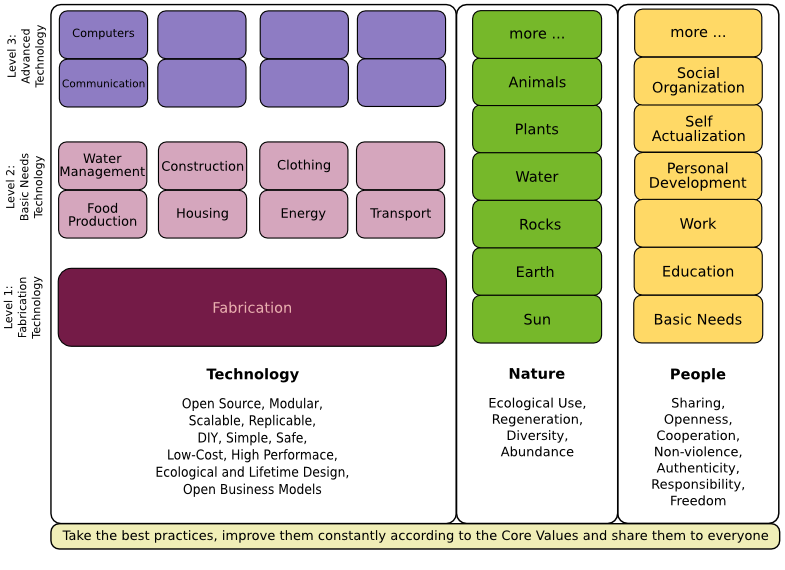Open Source Economy/en: Unterschied zwischen den Versionen
| Zeile 1: | Zeile 1: | ||
{{DISPLAYTITLE:Open Source Economy}} | {{DISPLAYTITLE:Open Source Economy}} | ||
{{Germany/en}} | {{Germany/en}} | ||
| + | |||
| + | The mission of Open Source Ecology (OSE) Germany is creating an Open Source Economy, an economy that '''optimizes both production and distribution''' while providing '''environmental regeneration''' and '''social justice'''. | ||
| + | |||
| + | We take the '''best practices''' for the technological, natural and social systems, '''improve them continually''' according to '''long-term sustainability values''' and share them to '''everyone'''. See it visually: | ||
| + | |||
| + | |||
| + | [[File:Open Source Economy.png]] | ||
| + | |||
| + | |||
| + | ==Technology== | ||
| + | We focus first on improving the technology through Collaborative Open Hardware Development and Open Business Models, and optimizing its distribution. | ||
| + | |||
| + | ===Collaborative Open Hardware Development=== | ||
| + | We develop economically significant technologies in the sectors housing, construction, farming, renewable energy, transportation, fabrication and more, according to [[Werte/en|long-term sustainability Core Values]] like replicability, modularity, scalability, simplicity, low-cost, high performance, use of local and natural resources. | ||
| + | |||
| + | The distribution of the technologies is optimized through open sourcing the designs and production processes, creating rapid learning materials and gaining experience through hands-on workshops. | ||
| + | |||
| + | ===Open Business Models=== | ||
| + | The transparency and open sharing of the business models and their improvement on-the-go enables adaptive and sustainable business structures for everyone. | ||
| + | |||
| + | ==Implications== | ||
| + | Once the technologies and business models are open sourced, people with access to flexible fabrication workshops can download the designs, adapt them to their local environment if needed and build the technologies. Then they share back their improvements and innovations and create additional value locally and globally. This '''open innovation cycle''' repeats itself and '''boosts rapidly economical improvements worldwide'''. The '''implications''' are enormous: | ||
| + | * we are able to create world-wide best practices open source technologies. | ||
| + | * the production and the economy is re-localized. | ||
| + | * work becomes meaningful through more conscious choices and maximized value distribution. | ||
| + | * we cover our basic needs and have more free time for higher pursuits. | ||
| + | * we transcend material scarcity. | ||
| + | * we create open education for everyone. | ||
| + | * we create a culture of openness, collaboration, solidarity, common welfare, meaning and peace | ||
| + | * human potential is unleashed. | ||
| + | * future generations inherit all physical technologies and open source documentation and build upon it. | ||
Version vom 23. August 2012, 18:28 Uhr
The mission of Open Source Ecology (OSE) Germany is creating an Open Source Economy, an economy that optimizes both production and distribution while providing environmental regeneration and social justice.
We take the best practices for the technological, natural and social systems, improve them continually according to long-term sustainability values and share them to everyone. See it visually:
Technology
We focus first on improving the technology through Collaborative Open Hardware Development and Open Business Models, and optimizing its distribution.
Collaborative Open Hardware Development
We develop economically significant technologies in the sectors housing, construction, farming, renewable energy, transportation, fabrication and more, according to long-term sustainability Core Values like replicability, modularity, scalability, simplicity, low-cost, high performance, use of local and natural resources.
The distribution of the technologies is optimized through open sourcing the designs and production processes, creating rapid learning materials and gaining experience through hands-on workshops.
Open Business Models
The transparency and open sharing of the business models and their improvement on-the-go enables adaptive and sustainable business structures for everyone.
Implications
Once the technologies and business models are open sourced, people with access to flexible fabrication workshops can download the designs, adapt them to their local environment if needed and build the technologies. Then they share back their improvements and innovations and create additional value locally and globally. This open innovation cycle repeats itself and boosts rapidly economical improvements worldwide. The implications are enormous:
- we are able to create world-wide best practices open source technologies.
- the production and the economy is re-localized.
- work becomes meaningful through more conscious choices and maximized value distribution.
- we cover our basic needs and have more free time for higher pursuits.
- we transcend material scarcity.
- we create open education for everyone.
- we create a culture of openness, collaboration, solidarity, common welfare, meaning and peace
- human potential is unleashed.
- future generations inherit all physical technologies and open source documentation and build upon it.
